
*
With 2013 fast approaching, we cast an eye upon the stack of unwatched (or partially watched) 2012 DVD and Blu-ray releases. We will save some for January, but otherwise now clear the decks in time for you to deck your halls with discs. Those which interest you, at least. So herewith are a clutch of films, some of which really do deserve more space than we have for them.
Like an assortment of items from the Criterion Collection, headed by Akira Kurosawa's Rashomon. This 1950 film won two major awards at the 1951 Venice Film Festival, becoming the first Japanese movie to achieve international acclaim — including an Academy Honorary Award as the best foreign film of the year. (In 1956, this became a category in its own right.) "Rashomon" is stark and riveting; it is also notable for being one of the few films to find its way into the psychological casebook (as "the Rashomon effect"). The film recounts a violent murder, with four participants offering contradictory eyewitness accounts. Between Kurosawa's intriguing storytelling, the strong performances (led by the riveting Toshiro Mifune), and the startling cinematography by Kazuo Miyagawa, "Rashomon" launched Japanese film into the western world and instantly established Kurosawa as a major force.
Criterion gives us an impeccable Blu-ray; they seem to take their time with their restorations, making sure they get everything right. Special features include an interview with director Richard Altman about the film; excerpts from "The World of Kazuo Miyagawa," about the cinematographer; and an hour-long documentary featuring interviews with cast and crew. This plus a booklet featuring an essay by historian Stephen Prince, an excerpt from Kurosawa's autobiography, and the two short stories (from 1915 and 1922) by Ryunosuke Akutagawa upon which the film is based. For repeated viewing, I myself prefer Kurosawa and Mifune's "Seven Samurai," which came along in 1954, and which is also available from Criterion on a spectacularly good Blu-ray. But "Rashomon" is not to be missed.
Visit PlaybillStore.com to check out theatre-related DVDs for sale.
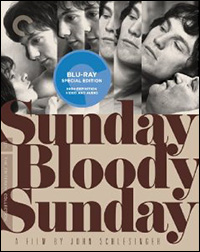 |
||
| Cover art |
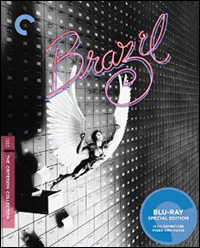 |
||
| Cover art |
The two-disc Blu-ray is loaded with extras, including the on-set documentary "What is Brazil?"; "The Production Notebook," a collection of interviews and video essays; "The Battle of Brazil," a documentary about Gilliam's problems with his producers; and Universal's shortened, happy-ending cut of the film. All told, Criterion's "Brazil" — with extras — is a release you can spend hours watching and rewatching.
Visit PlaybillStore.com to check out theatre-related DVDs for sale.
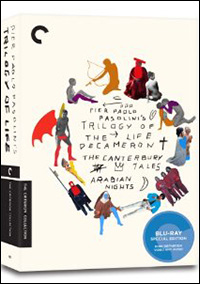 |
||
| Cover art |
Pasolini next moved to England for "The Canterbury Tales" (1972). Once again, he spun his film together from a bunch of unrelated tales; both films are somewhat haphazardly assembled, without clear beginnings and endings. "Canterbury" is crammed full of colorful locations, peasants, teeth and skin. There are a few recognizable actors mixed in as well, notably Hugh Griffith (from "Tom Jones" and an Oscar-winning turn in "Ben-Hur") as a lusty Lord and Josephine Chaplin — daughter of Charles — as his beautiful-and-bored wife May. Also on screen is Pasolini himself, as the author Chaucer; he also played an artist — a fresco painter identified merely as "Giotto's pupil" — in "The Decameron."
Pasolini traveled to Africa and Asia for the final part of his trilogy, "Arabian Nights" (1974). All three are fascinating, although "The Decameron" was surely the most startling of the three at the time (and might be the most watchable now). "The Trilogy of Life" is a remarkable triptych of films unlike few if any others. For Pasolini, that was more or less the end; he was violently murdered under mysterious circumstances in 1975, just before the release of his final film.
Visit PlaybillStore.com to check out theatre-related DVDs for sale.
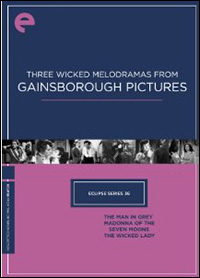 |
||
| Cover art |
*
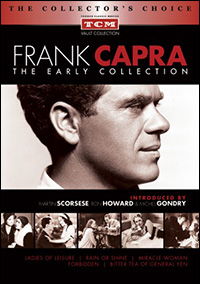 |
||
| Cover art |
The five-DVD box set in question includes four of the films he made with Barbara Stanwyck, developing her into a star. These include "Lady of Leisure" (1930, adapted from a David Belasco drama); "The Miracle Woman" (1931); "Forbidden" (1932); and the most interesting of the lot, "The Bitter Tea of General Yen" (1933). This last was a melodrama about an interracial romance between a white woman and a Chinese warlord, which proved a difficult subject for the time. The first film to play Radio City Music Hall, it was unceremoniously yanked midway through its scheduled two-week engagement.
The Capra set is short on bonus features — the point, here, it to rescue these films from oblivion — but there are introductions from Martin Scorsese, Ron Howard and Michel Gondry. The other title in the set is a Broadway-related novelty. Joe Cook was one of those stage comedians of the '20s who had musical comedies written around him. (Others in this category included W.C. Fields, Will Rogers and Bert Lahr.) One of Cook's musicals was the 1928 hit Rain or Shine, which ran 11 months. The movie rights were duly purchased, but by the time filming began movie musicals were in a slump. Thus, Joe Cook recreates his role in Frank Capra's "Rain or Shine" (1930), but the score — by Milton Ager, Owen Murphy and Jack Yellen — is cut altogether. The story is apparently changed as well; the plot is still built around a traveling circus, but the whole thing ends up in flames. Which would not have worked so well on stage.
Cook, though, is interesting to watch; a likable fast-talking hero whose straight-faced but overlong explanations turn to gibberish. His acrobatic background is in evidence; he does a nifty act with Indian clubs plus a pretty good — and funny — tight-rope walking stunt. He brought along his two stooges from the Broadway production. Tom Howard is a crusty old-timer, playing a country businessman who can't keep up with Cook's scams. The other fellow — playing a slow-witted rustic whose trademark is a slow wave of the hand — is a fellow named Dave Chasen. He stayed in Hollywood, and — at the urging of Capra and with financial backing from New Yorker editor Harold Ross — opened a chili joint in Beverly Hills. Chasen's went on to expand itself into an internationally renowned landmark, outliving its owner (who died in 1973) and closing in 1995.
Visit PlaybillStore.com to check out theatre-related DVDs for sale.
(Steven Suskin is author of "Show Tunes," "The Sound of Broadway Music: A Book of Orchestrators and Orchestrations," "Second Act Trouble," the "Broadway Yearbook" series and the "Opening Night on Broadway" books. He also pens Playbill.com's Book Shelf and On the Record columns. He can be reached at [email protected].)










